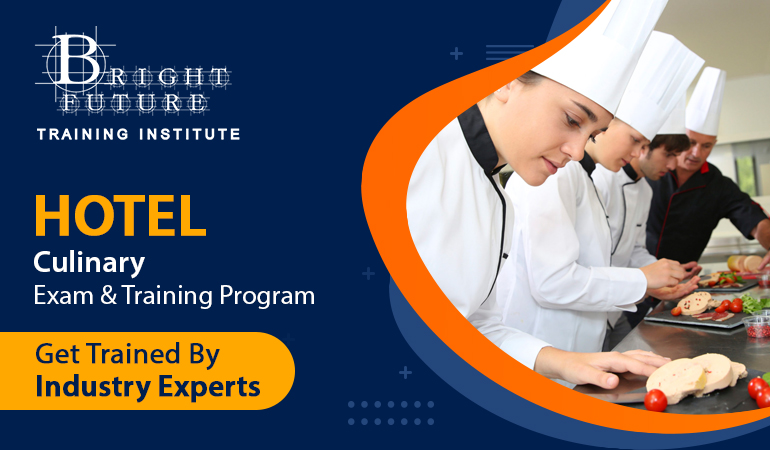

Culinary course in Dubai is divided into theoretical and practical modules. The theory classes will be conducted in our bur Dubai campus whereas the practical training will be delivered in start hotel’s kitchen by executive chef. Students will get the following support in culinary training programs:
At Bright Future Training Institute, we offer short-term courses for students who are not looking for a full term length education. These are generally month-long courses based on specific aspects of the culinary arts.
1.1. Sanitation and Safety
1.2. Menu Planning, Knife Skills
1.3. Soups and Stocks
1.4. Garde Manger
2.1. Salads
2.2. Meat Cookery
2.3. Poultry Cookery
2.4. Game Cookery
3.1. Shellfish Cookery
3.2. Beef Cookery
3.3. Vegetable Cookery
3.4. Starches Cookery
4.1. Breakfast Preparation
4.2. Baking and Restaurant Desserts
4.3. International Cuisines
1. Introduction to Microbiology
2. Food Borne Diseases
3. Personal Hygiene
4. Food Handling, Preparation, and Storage
5. Cleaning and Sanitizing Equipment
6. Sanitation Test
7. The Safe Workplace
8. Kitchen Safety
1. Modern Food Service
2. The Organization of Modern Kitchens.
3. Standards of Professionalism
3.1 Knife Skills
4. Moist Heat Method
4.1 Dry Heat Methods
4.2 The Arts of Seasoning
4.3 Introduction of equipment
5. Equivalents of Weights and Measures
6. Dry and Liquid Measurements
6.1. The Written Recipe
6.2. Converting Recipes
6.3. Food Cost
7. Menu Forms and Functions
8. Building the Menu
9. Nutritional Considerations
1. Ingredients 1.1. Procedures and Methods of Stocks Reduction
1.2. Glace
2. Leading and Mother Sauces
3. Roux 4. Modern Sauces
5. Butter Sauce
1. Classification of Soups
2. Cream Soups
3. Clear Soups
4. Hearty Soups
5. Chowder Soups
6. Bisque
1. Hors d’ oeuvres
2. Sandwiches
3. Canapés
4. Cocktails
5. Dips
1. Types of Salads
2. Presentation
3. Components of a Salad Bar
4. Dressing Types: French dressing, Garlic dressing, Lemon dressing etc
5. Art of Garde Manger
1. Grilling Method
2. Braising Method
3. Stewing Method
4. Pan Frying Method
5. Sauté method
1. Chicken Fabrication
2. Sauté Method
3. Pan Frying Method
4. Braising Method
5. Poaching Method
6. Grilling Method
7. Deep Fry Method
1. Grilling Method
2. Braising Method
3. Stewing Method
1. Fish Fabrication
2. Broiling Method
3. Sauté Method
4. Pan Fry Method
5. Deep Fry Method
6. Grilling Method
7. Poaching Method
1. Beef identification and fabrication
2. Broiling Method
3. Sauté Method
4. Pan Fry Method
5. Deep Fry Method
6. Grilling Method
7. Poaching Method
3.3 UNDERSTANDING AND COOKING VEGETABLES:
8. Controlling Quality Changes during Cooking
9. General Rules of Vegetable Cookery
10. Standards of Quality in Cooked Vegetables
11. Handling Fresh and Processed Vegetables
12. Production and Holding Problems in Quantity Cooking
13. Storage
14. Boiling and Steaming
15. Sautéing and Pan-frying
16. Braising
17. Baking
18. Broiling and Grilling
19. Deep-frying
1. Potatoes
2. Rice
3. Pasta & Dumplings
4. Other Grains
5. Stuffing and Dressings
6. Pilaf Method
1. Understanding and Cooking Eggs
2. Breakfast Breads, Cereals, and Meats
3. Milk, Cream, and Butter
4. Cheese
1. Plated desserts
2. Sauces
3. Cakes
4. Tarts
5. Mousses
6. Soufflé
1. Arabic
2. French
3. Spanish
4. Mexican
5. Italian
6. Thai
There is a strong demand for trained chefs/ cooks and the food and beverage industry is now offering good salaries and working conditions to attract skilled personnel. Graduates may find employment as cooks or assistant cooks in the food service departments of restaurants, hotels, motels, resorts, cruise ships, institutions and catering companies. With further training, graduates may advance to positions as commis de cuisine, department chefs, junior sous-chefs, executive sous-chefs, chefs de cuisine and executive chefs de cuisine. Graduates may also pursue self-employment opportunities.
1. Provide fundamental culinary planning, preparation, and presentation to a variety of food service environments.
2. Apply basic and advanced food and bake theories and other related theories to all aspects of food preparation.
3. Contribute to the provision of a healthy, safe, and well-maintained kitchen environment and to the service of food and beverage products that are free from harmful bacteria or other contaminants.
4. Apply a knowledge of kitchen management techniques, as required, to support the goals of the operation and the responsible use of resources.
5. Apply fundamental nutritional principles to all aspects of food production.
6. Perform effectively as a member of a food and beverage preparation and service team.
7. Apply cost control techniques to food-service operations.
8. Apply self-management and interpersonal skills to enhance performance as an employee and team member and to contribute to the success of a food-service operation.
9. Develop ongoing personal professional development strategies and plans to enhance culinary, leadership, and management skills for the hospitality environment.
10. Identify and apply discipline-specific practices that contribute to the local and global community through social responsibility, economic commitment and environmental stewardship.
Foundation Level 1: 20 credit hours
Professional Level 2: 40 credit hours
Bright Future is top ranked training center in Dubai, which has been delivering dynamic training solutions for job seekers, industry professionals and corporate companies. The salient features of taking training at Bright Future Training Institute, Dubai are as below;
1. Individual attention
2. Hands on practice
3. Classroom training
4. Online Sessions
5. Industry Visit
6. Interview Skills
7. Internship & Job assistance
8. Accommodation & travelling support

Bright Future is committed to culminate the wished results with a perfect blend of senior educationists and young breed of energetic trainers on its faculty. We are an affiliate partner of British Council and consistently generating 7 -9 Bands of both ielts academic and ielts general tests.
Bright Future is committed to culminate the wished results with a perfect blend of senior educationists and young breed of energetic trainers on its faculty. We are an affiliate partner of British Council and consistently generating 7 -9 Bands of both ielts academic and ielts general tests.